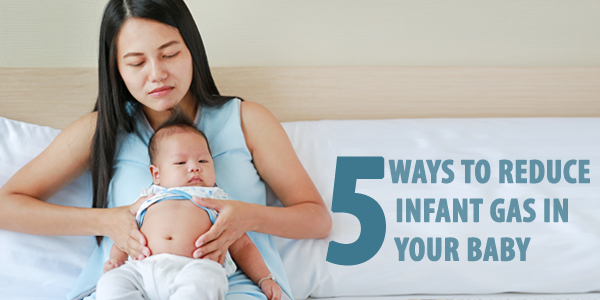 Just when you settled down with a book and dared to have a little ‘me-time’ your baby starts grunting and grimacing and you know it’s baby gas. What you also need to know, is that it’s common and it’s going to be happening at least for the first 4 to 6 months. Gas in babies is common largely because of their underdeveloped digestive systems. The diet of the breastfeeding mother and the quality of the formula too can cause gas. So, here’s what you can do to help your baby during a gassy episode:
Just when you settled down with a book and dared to have a little ‘me-time’ your baby starts grunting and grimacing and you know it’s baby gas. What you also need to know, is that it’s common and it’s going to be happening at least for the first 4 to 6 months. Gas in babies is common largely because of their underdeveloped digestive systems. The diet of the breastfeeding mother and the quality of the formula too can cause gas. So, here’s what you can do to help your baby during a gassy episode:
- Burp your baby: Much of the discomfort is caused during breastfeeding when your baby ends up gulping air. In addition to burping your baby after breastfeeding, tap its back gently to get rid of swallowed air before gas makes its way to the baby’s bowels. One sign of your baby getting gassy during feeding is when it turns its head away from the breast or bottle. This is not always due to baby feeling full and could be an indicator of gas. If you’re breastfeeding your baby will need a mid-eal burp every 5 to 10 minutes. If you’re bottle feeding, you can try burping your little one every 2 to 3 ounces.
- Control swallowing of air: Be it bottle or breast feeding, your baby is going to be swallowing some air. Control this by feeding your baby in a more upright position. If you’re breastfeeding make sure your baby tightly latched on to you. For bottle-feeding use anti-gas nipples which can change the flow of the milk and reduce the amount of air baby can swallow. Avoid shaking the bottle too much, as it could create more bubbles. You can also give concentrated liquid or ready-to-feed formula instead of powder.
- Tummy down massages: Lay your baby tummy-down across your knees and hold the baby under the belly with your forearm and gently massage the back. The pressure on the tummy can help relieve pressure from the gas. Moreover, your touch will calm your disgruntled baby. You can lay your baby on its back and gently cycle its legs in a bicycling motion towards your baby’s tummy to help push out trapped air. Or you can gently push your baby knees towards the tummy and hold for 10 seconds. Repeat this several times.
- Check your diet while breastfeeding:Talk to the pediatrician about what foods you need to cut down to reduce gassy episodes in your baby. Milk products, caffeine, onions and cabbage are some of the gas inducing foods you’ll want to avoid. Some formulas too, induce gas, check with the pediatrician whether it’s worth giving a new formula a shot.
- Chamomile can be a saviour: Some doctors suggest feeding your baby some chamomile tea using a dropper or by mixing it in the milk; it helps relieve colic symptoms. Breastfeeding moms are also told to drink chamomile tea.